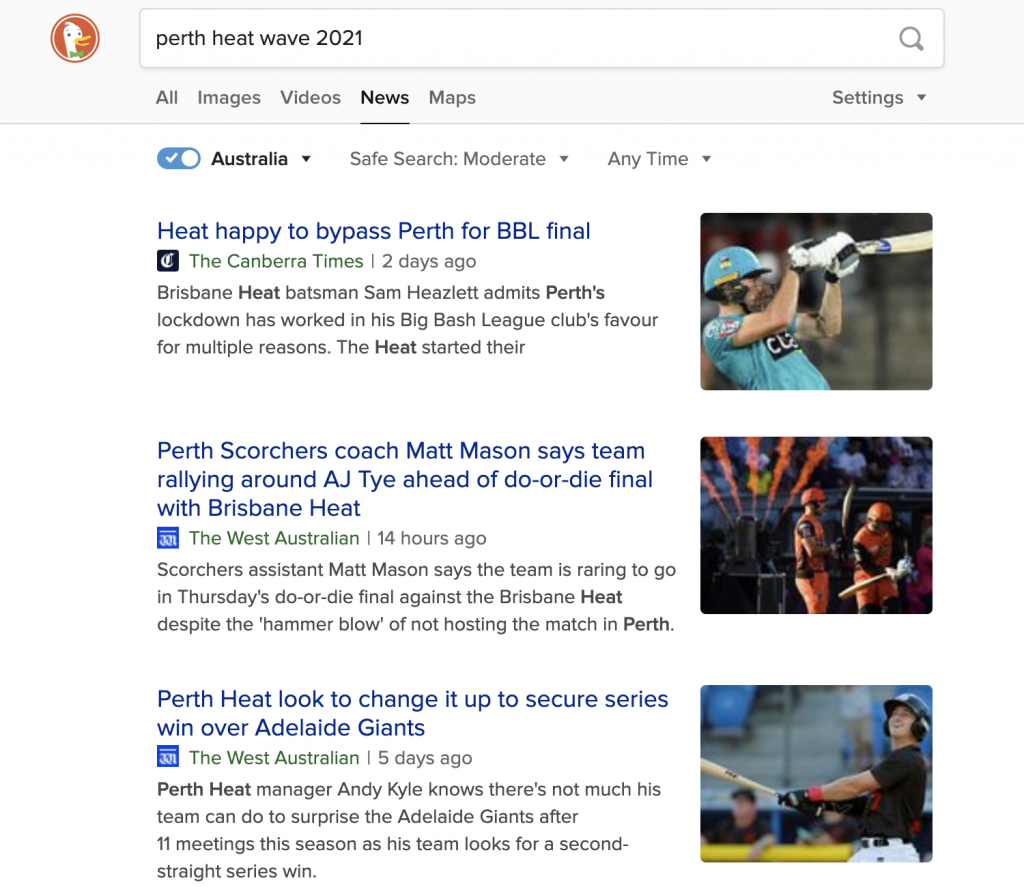Mel Silva, CEO of Google in Australia, has reiterated her threat that if the Government makes the tech company pay for news, they would simply ‘turn off’ search here. Google accounts for 98% of all search in this country, so it’s easy to forget that the platform is not the only option. There are Google search alternatives!
So while the tech giant and Scott Morrison continue this very intense stare down, we’ve decided to get prepared for a post-Google reality and check out the competitors. We’ll use each of these search engines for a week, and update the story with our preferred option. Why not join us and run a trial of your own too?
A quick note on perceived quality: A lot of people will say that Google search alternatives are “just not as good”. That might be true, but it’s worth remembering that the reason why search competitors have not been able to develop their product is precisely because Google is so dominant. It has effectively created a monopoly that has eliminated real competition. If given the space and user base, any of these (or a new) search engine alternatives could develop to be as good or better.
The same is true for Google! They too are a serial monopoly abuser. Laws and regulations must rise to counter that threat. At the same time, the Chrome team has been an awesome job moving the web and its standards forward. I want the former stopped, the latter celebrated.
— DHH (@dhh) January 31, 2021
Bing
Microsoft-owned Bing is probably the most serious contender to become Australia’s Google search alternative. It’s the third-largest search engine in the world, after Google and Baidu in China. Like Google, it is a search engine in the purest sense – it’s not powered by a third-party, so the technology Bing uses to crawl the web for your answer is it’s own creation.
It’s not as private as DuckDuckGo – again, it’s a traditional tech company that is monetising your data – but because Bing doesn’t have an all-encompassing suite of products like Google does, your search data is more isolated from the rest of your online presence. For some people, that’s enough.
OUR RATING: 5/10 – Bing was just okay. It threw out odd results from time to time, and it uses some of the same naughty tools that Google does to prevent web traffic going to the site or publisher. For example, using a preview box to give you the vital info from this Urban List article, which prevents users from needing to read the article itself. This is one of the tactics that tech platforms use to deprive publishers of traffic and, therefore, advertising revenue.
Ecosia
This Germany-based search engine wants to use your queries as a force for good! Ecosia donates 80% of profits to tree-planting non-profits, is carbon-negative, and B Corp certified. According to the company’s most recent reports, they’ve planted more than 100 million trees to date.
Bing powers the search results, but they are ranked and presented by the Ecosia algorithm.
Ecosia is also a ‘privacy-friendly’ search engine. That means it encrypts your searches and doesn’t store them permanently, and the company does not sell your data to third-party advertisers.
It makes money by running ads that appear next to your results – pretty standard. The ads are also powered by Bing.
OUR RATING: 7/10 – Ecosia delivered the most consistent search results during the week-long trial. It’s interesting given that Bing powers the search functionality, but during our test the Ecosia algorithm seemed do a better job of matching the results to the search query better. If Google pulled search out of Australia (although that looks less likely now) Ecosia would be our pick.
Related Posts
Duck Duck Go
If privacy is your main concern, DuckDuckGo is the pick of the Google search alternatives. It does not track or store your data, which means search results are not ‘tailored’ to you. Everyone gets the same results for the same search query, a powerful stance to take in this era of echo chambers and information bubbles.
DuckDuckGo’s search engine is powered by a variety of sources – most commonly from Bing. While it pulls results from over 400 sources, it does not take anything from Google.
Like all other search engines, DuckDuckGo makes money by showing ads next to your results. Unlike other platforms, the ads are based purely on search terms and not on user profile (because they don’t have a profile on you). They also make money through affiliate links when you click through DuckDuckGo to buy something on eBay or Amazon.
As a core part of its mission, DuckDuckGo makes regular donations to projects that are improving standards of privacy or access to free and accurate information on the web.
OUR RATING: 4/10 – We really wanted to like DuckDuckGo, but the results it gives are a bit of a hot mess. It interprets every search query very literally – unless you use Boolean search symbols, it will treat each word in the search phrase as a separate keyword. There is nothing technically wrong with that, but it is not how the majority of people use search engines, making it much less intuitive.

For example, it interpreted our query “Perth heat wave” as a search for the baseball team, Perth Heat. It wasn’t able to interpret the misspelling of “heatwave” at all. However, Google, Bing and Ecosia all identified that the inclusion of the word “wave” changed the intention of the search query to one looking for weather info – a much more intuitive experience for users.







